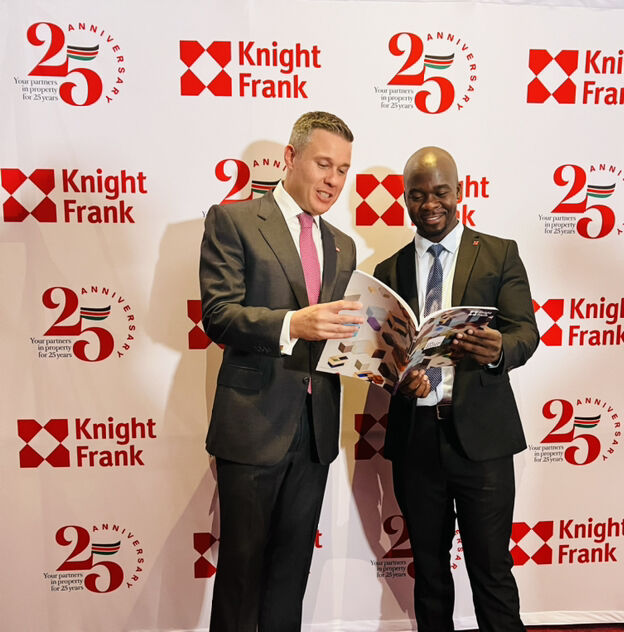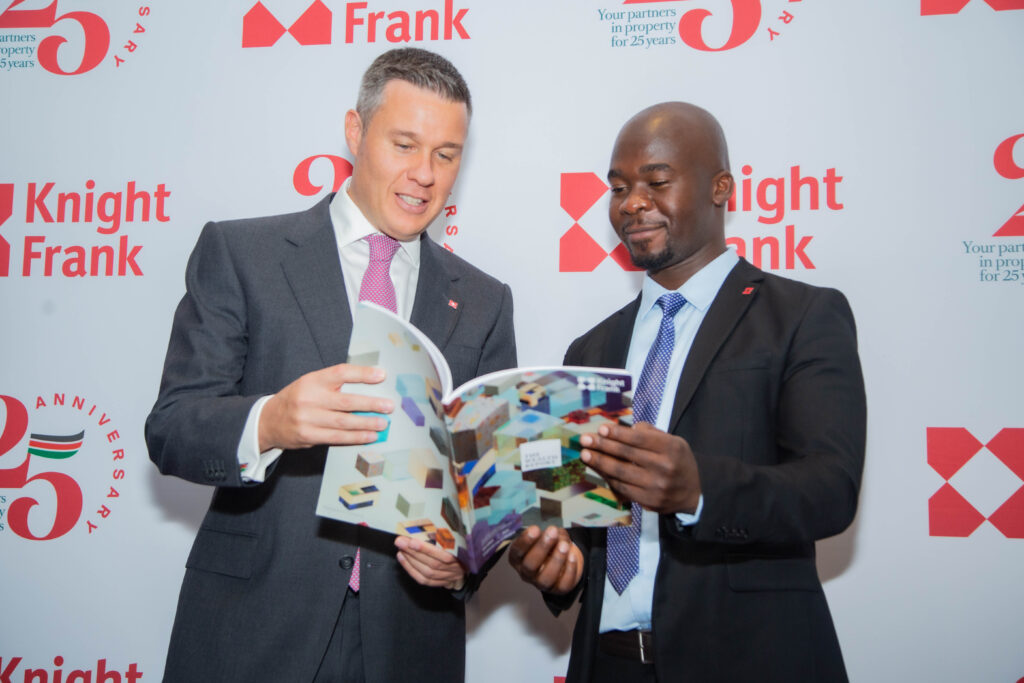
Mark Dunford,CEO Knight Frank Kenya,Liam Bailey,Global Head of Research and Editor-in-Chief of The Wealth Report,Knight Frank in a previous launch
- Knight Frank Kenya Releases H2 2024 Kenya Market Update: Real Estate Faces Headwinds Amid Economic Uncertainty;
Knight Frank Kenya, a leading real estate agency, has unveiled its highly anticipated Kenya Market Update H2 2024, offering a comprehensive analysis of the country’s economic and real estate landscapes.
The report provides in-depth insights into the performance and trends across various sectors, including the macro-economy, capital markets, office space, retail, residential, industrial and infrastructure, and alternative markets.

MACRO ECONOMY & CAPITAL MARKETS
Kenya’s economy remained under pressure in H2 2024, with GDP growth decelerating to 4.7%, down from 5.6% in 2023.
High public debt and subdued private investment slowed overall growth.
However, inflation stabilized within the CBK’s target range of 2.5% – 7.5%, and the Kenya Shilling gained 20.86% against the USD, closing the year at KES 129 per USD.
While interest rates remained high, the CBK base rate dropped from 13% to 11.25%, easing pressure on borrowers. The Nairobi Securities Exchange (NSE) remained subdued, with government securities continuing to dominate investor interest.
“Kenya’s resilience remains strong despite economic challenges. With inflation and the Kenya currency stabilizing, we see continued investor confidence and exciting opportunities for strategic, long-term investments.” – Mark Dunford, CEO, Knight Frank Kenya

INFRASTRUCTURE & POLICY
Infrastructure development remained constrained due to public debt concerns, leading the government to favour Public-Private Partnerships (PPPs). Notable infrastructure projects included the completion of the KES 40 billion Dongo Kundu Bypass and progress on the Mombasa SGR-MGR link project. Policy shifts also impacted real estate, with the National Rating Bill 2022 establishing a uniform framework for county land and building rates.
Meanwhile, a landmark court ruling on commercial lease terms is set to redefine landlord-tenant relationships.

OFFICE
The Nairobi office market faced declining occupancy levels, dropping to 72.7% due to an oversupply of space. New office completions added 522,284 sq. ft. of prime space, including Purple Tower, Highway Heights, and The Mandrake. However, monthly prime office rents held steady at USD 1.2 per sq. ft.
“The Nairobi office market is adjusting to shifting demand, with a steady rise in flexible workspaces,” said Mark Dunford, CEO, Knight Frank Kenya.
 RETAIL
RETAIL
Retailers continued expansion despite economic challenges, with over 250,000 sq. ft. of new retail space completed in H2 2024. Notable projects included Mwanzi Market, Runda Mall, and The Cove in Lavington. Supermarkets adapted by opening smaller outlets in residential areas and petrol stations, rather than relying solely on malls.
Naivas, Carrefour, and Chandarana continued to expand, while global retailer Decathlon launched a 64,500 sq. ft. store at Westgate Mall, reflecting a growing focus on active lifestyles.

RESIDENTIAL
The prime residential market saw increased demand, with sale prices rising 8.27% year-on-year, up from 2.45% in 2023. Prime rental prices also grew 6.56% in H2 2024.
Zoning changes in areas like Kilimani continued to transform Nairobi’s skyline, while the “build-to-sell” model gained traction, particularly in Westlands, Runda, and Kiambu Road.

HOSPITALITY
Kenya recorded a historic 2.5 million tourist arrivals in 2024, boosting demand for hotel accommodations. The period saw a surge in luxury and upscale hotel openings, including Novotel Westlands, Hyatt House, and Okash Hotel Nairobi.
Upcoming projects include the KES 1.2 billion Courtyard Hotel near JKIA, further cementing Nairobi’s status as a regional business hub.
“The hospitality sector’s remarkable growth reflects Kenya’s resilience as a leading tourism and business hub in Africa. With strong visitor arrivals and luxury developments, we anticipate sustained expansion in this space.” –Charles Macharia, Senior Research Analyst, Knight Frank Kenya.

INDUSTRIAL
Despite economic pressures, the industrial sector remained a bright spot, with Special Economic Zones (SEZs) attracting fresh investment.
Nairobi Gate Industrial Park launched its USD 7 million fifth phase, while manufacturing giants like Kim-Fay secured KES 2.5 billion in funding for new facilities.
However, high production costs and power challenges continued to affect the sector, with Kenya’s first nuclear power plant planned for 2027 at a cost of KES 500 billion.
ALTERNATIVE MARKETS
Data centers gained momentum, with Digital Realty, IX Africa, and Africa Data Centres investing heavily in Kenya’s tech infrastructure. Meanwhile, the government’s KES 10 billion affordable housing initiative aimed to boost homeownership, though private developers increasingly led the charge in delivering new housing solutions.










1 thought on “Knight Frank:Real Estate Faces Headwinds Amid Uncertainties”